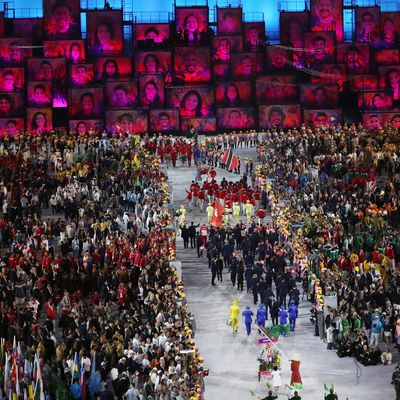
Can anything be done to get the Olympics out of NBC’s clutches?
The network’s coverage of the opening ceremony in Rio de Janeiro was typically clueless and counterintuitive, cutting away to a commercial every few minutes, inserting “expert” commentary in a window in the lower left-hand corner, and interrupting the spectacle to show us images of U.S. athletes preparing to enter next-door for the Parade of Nations (as if we didn’t already know that we were going to see American athletes if we stuck around). The entire thing was delayed, as is tradition whenever the Games appear in another time zone — an increasingly ridiculous practice in the age of social media, which makes it possible to at least partially follow events live, even if television does not deign to cover them that way.
Worse was the blather by co-hosts Matt Lauer, Meredith Vieira, and Hoda Kotb — a low point even by the already-weak standards of Olympics commentary in this country. Coverage of the Macy’s Thanksgiving Day Parade typically has more thoughtful remarks. Throughout the opening production number, which was overseen by Brazilian filmmaker Fernando Meirelles (City of God), the hosts made remarks that seemed paternalistic, designed to diminish Brazil’s achievements in hosting the Games (under difficult national circumstances) and mounting such a logistically and aesthetically impressive introduction. An elaborate tribute to Alberto Santos-Dumont — who Brazilians believe actually invented powered flight in a heavier-than-air machine — was practically laughed off by the hosts, although many Brazilians would say that what the Wright brothers did at Kitty Hawk in 1903 was nothing more than a dry run for Santos-Dumont’s achievement a few years later. “We’ll let them have that one,” Kotb laughed.
We already know that Brazil has a crime problem — a lot of countries do — but I’m still not sure it was necessary for Lauer to warn that if anybody watching the telecast was thinking of visiting São Paulo, “we’ve got a story coming up that’ll make you think twice.” The narration accompanying the Parade of Nations was filled with factoids that seemed randomly picked out of an old encyclopedia, and the entire broadcast was delayed by half an hour so that NBC could show a canned prelude, plus a five-minute segment that was basically an ad for the NBCUniversal-owned Golf Channel.
NBC’s irritating strategy has been official practice since the 1980s, but it became especially odious during the 2000 Games in Sydney: That’s when the network decided to treat the world’s greatest international display of athletic prowess not as a news event, but as raw material with which to create sentimental and softheaded entertainment “product” — much of it taking the form of prerecorded “up-close-and-personal” biographical sketches, the result of focus-group research contending that women don’t care about sports unless there’s an uplifting story about the athletes.
The network also, of course, treats the Games as mere fodder with which to sell ads, which explains the incessant commercial breaks throughout the nearly five-hour telecast, most of which were indifferent to the rhythms of whatever was on-screen. I would love to see what a real sports broadcaster could do with such an astonishing convergence of sports, politics, and history. At the very least, it might have respected the momentum of the entire production and filled its commentary with information that was actually germane — such as the fact that there used to be a museum of indigenous people near the stadium where the opening ceremonies occurred, which was bulldozed in the run-up to the same Games that celebrated those people’s presence in the national narrative.
The opening itself was rich and unusual enough to have stood on its own, without any verbal commentary. Never in my lifetime has one of these things done anything but glorify the country hosting the Games and repeat its national myths, while downplaying any hint of drama or strife. This one was shockingly honest. It started with the creation of water, then continued with the formation of the land and jungle, the rise of indigenous people, the appearance of European colonists, the rise and fall of the slave trade, and the gradual subjugation of the countryside to roads and cities. The latter was conveyed very cleverly via the ceremony’s elaborate and colorful video projections, which cut white paths through green “forests,” carved the jungle into a patchwork of trapezoids suggesting farmland, then finally covered the stage with multilayered, boxlike, high-rise apartments reminiscent of the dollhouse-style city sets in films by French director Jacques Tati.
The portrait painted was one of incredible creativity and industry arising out of racial and political strife. At one point, the entire production paused to consider Brazil’s complicity in the global tragedy of climate change, using animated maps to show rising waterlines submerging coastal cities.
The whole thing might’ve been much more effective with subtitles giving us contextual bits of information — such as the fact that Brazil abolished the slave trade in 1888, or about the population and demographic makeup of São Paulo at different points in its history — instead of having the narrators chime in with whatever insipid factoids the producers were reciting into their earpieces while reading Wikipedia in the control room. But this would require NBC, or whichever network eventually supplants them, to treat the opening ceremony as a news event and artistic and political statement, rather than as the stuff that happens to appear between commercials. And it would require respect for the self-images of countries besides the United States. Based on NBC’s decades of condescension and disrespect, it’s hard to imagine such a thing ever happening.





